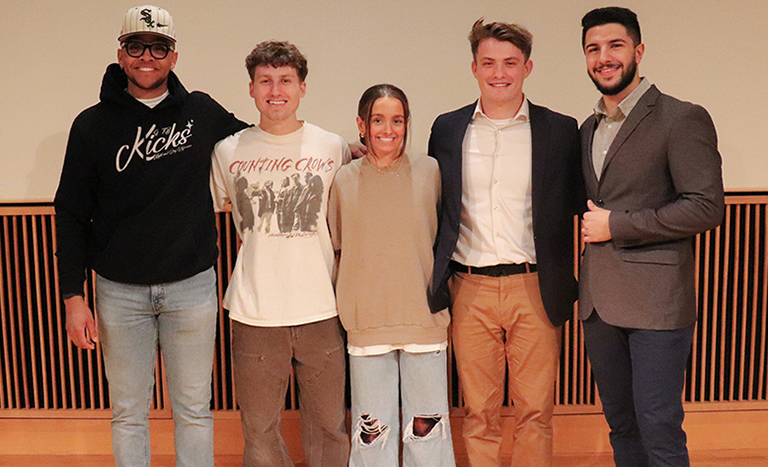
Three University of Missouri student teams recently won a combined $30,000 in funding for their businesses through the Entrepreneur Quest (EQ) pitch competition. This year’s winners are:
- First place, $15,000: Ako Hamaamin and Noah Strodtman
- Second place, $10,000: Blake Brown
- Third place, $5,000: Mason Schaedel and Hallie Wilt
Much like on the television series “Shark Tank,” each team had six minutes to pitch their ideas and four minutes to answer questions from a panel of judges.
“We are very proud of the effort and dedication of this year’s EQ students,” said Greg Bier, executive director of entrepreneurship programs at MU. “It takes tremendous effort to build out a business while also being a full-time student. They spent a lot of nights and weekends crafting their ideas into viable ventures, and we are eager to help them continue growing.”
During the fall semester, undergraduate and graduate students from engineering, business, journalism, social work, economics and graphic design applied for a chance to participate in EQ. The top 15 teams took part in an elevator pitch competition. Nine of the most promising ventures, including the $1,500 audience favorite winner, Partner for Better, won spots in the intensive, multi-week EQ education program offered by the Griggs Innovators Nexus.
EQ workshops and coaches guide students through the process of refining their business ideas based on customer needs. It challenges them to take advantage of a multitude of industry and marketplace resources at Ellis Library and to validate and test their ideas using customer interviews and surveys. The teams also receive services through the School of Law’s Entrepreneurship Legal Clinic and coaching from campus and community experts.
Bier said successful storytelling is an important component when pitching ideas to potential business investors. This year, the teams worked with Claire Syler, assistant professor of theatre, who helped them hone their pitches to convey their venture ideas more effectively.
“There are lots of ideas out there, and these students are brave enough to pursue them,” said Gwen Gray, the business, economics and entrepreneurship librarian who assists EQ teams researching their industries, potential markets and customer data. “The ingenuity of Mizzou’s entrepreneurial students always amazes me.”
This year’s pitch competition judges were Brooke Bartlett, co-owner of GoPo Gourmet Popcorn; Brant Bukowsky, co-founder of Veterans United Home Loans; Todd Hoien, market president at Hawthorn Bank; Arpita Kumar, head of integration, mergers, acquisitions and strategic initiatives at Indeed.com; Lisa Lorenzen, assistant vice chancellor of the MU Office of Technology Advancement; and Michael Mueller, vice president of research and development at Aperio Consulting Group.
“Entrepreneurship can seem really challenging and unattainable,” said Mueller, BS ’15, MBA ’18, who recently founded Two Story, a business intelligence startup company. “I want to encourage the next generation of entrepreneurs to press on.”
Meet this year’s winners.